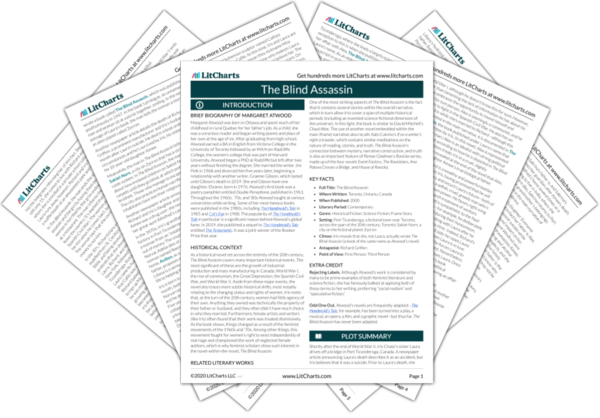Sakiel-Norn, the fictional alien city on the planet Zycron in the science-fiction story that the man in The Blind Assassin tells his female lover, symbolizes the horrors and violence inherent to human society. Sakiel-Norn is a brutally hierarchical, oppressive, and violent place. At first it might seem as if Sakiel-Norn is notably separate from the human world—after all, it is part of an invented alien planet with its own language, religion, caste system, and cultural practices that have no direct translation to societies on Earth. Indeed, the woman in The Blind Assassin regularly objects that the city and the story the man tells about it is too violent, indicating that she believes it is more horrifying than the reality of life on Earth. However, over the course of the narrative, it becomes clear that the woman’s objections are rooted in the naïveté that has resulted from the sheltered life she’s led as the upper-class daughter of a manufacturer (and later the wife of an even wealthier manufacturer).
The truth is that all the horrors that take place on Sakiel-Norn actually do correspond to what exists in human society, even if this connection is obscured by the science-fiction setting. The slavery, racism, violence, rape, labor exploitation, and murder that take place on Sakiel-Norn are all part of human history, too. Indeed, the connection between Zycron and Earth is solidified when the man explains that, in the world of the story, humans are descended from Zycronites, meaning that the beings who live in Sakiel-Norn are not aliens, but human. In this sense, Sakiel-Norn represents the violence and brutality that is an integral part of human existence, yet it also reflects how people can deny the reality of this brutality due to their own ignorance and naïveté.
Sakiel-Norn Quotes in The Blind Assassin
The Ygnirods were resentful of their lot in life, but concealed this with the pretense of stupidity. Once in a while they would stage a revolt, which would then be ruthlessly suppressed. The lowest among them were slaves, who could be bought and traded and also killed at will. They were prohibited by law from reading, but had secret codes that they scratched in the dirt with stones. The Snilfards harnessed them to ploughs.
The carpets were woven by slaves who were invariably children, because only the fingers of children were small enough for such intricate work. But the incessant close labour demanded of these children caused them to go blind by the age of eight or nine, and their blindness was the measure by which the carpet-sellers valued and extolled their merchandise: This carpet blinded ten children, they would say. This blinded fifteen, this twenty.
I tell you the stories I’m good at, he says. Also the ones you’ll believe. You wouldn’t believe sweet nothings, would you?
No. I wouldn’t believe them.
Like many peoples, ancient and modern, the Zycronians are afraid of virgins, dead ones especially. Women betrayed in love who have died unmarried are driven to seek in death what they’ve so unfortunately missed out on in life.
I feel sorry for him. I think he’s only doing the best he can.
I think we need another drink. How about it?
I bet you’re going to kill him off. You have that glint.
In all justice he’d deserve it. I think he’s a bastard, myself. But kings have to be, don’t they? Survival of the fittest and so forth. Weak to the wall.
You don’t really believe that.
The sudden invasion changes things for the Zycronians. Barbarians and urbanites, incumbents and rebels, masters and slaves—all forget their differences and make common cause. Class barriers dissolve—the Snilfards discard their ancient titles along with their face masks, and roll up their sleeves, manning the barricades alongside the Ygnirods.












